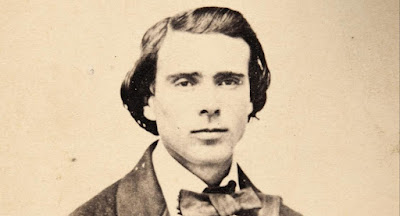The narrative of the
Black Hawk War in all versions of Cooke's "Scenes and Adventures in the Army," referenced in our post on
"wilderness/wilds then," is a rewrite of primary sources, heavily indebted to the eyewitness account (signed "H.") by Henry Smith,
"Indian Campaign of 1832", published in the August 1833 issue of the
Military and Naval Magazine of the United States.
As soon as it appeared in print, Smith's first-hand narrative of the Black Hawk War was particularly recommended to readers of the Albany
Argus:
"The August number of the Military
and Naval Magazine, has just been published, and is for sale by the agent,
Mr. Little. It has reached its sixth
number, and of course completed its first volume. The present No. contains several original
articles of interest. It is an
improvement in this respect upon the previous numbers, so far as they have met
our observation. Among these is a narrative of the Indian campaign of 1832, being an account, more or less in
detail, of the expedition against the Sauks (as the writer has it) and the
Foxes."
Albany Argus,
Friday, August 9, 1833
Without knowing the identity of "H.," Cooke's biographer
Otis E. Young nevertheless perceived the essential link between Cooke's telling and Henry Smith's article in the
Military and Naval Magazine:
"Although certain statements made in this article are in contradiction to known facts of Cooke's life, the style is very similar to his. Furthermore, the author witnessed the battle of Bad Axe and reported his experiences with about the same emphases and orientation as Cooke in Scenes and Adventures. This evidence suggests that "H", if not Cooke himself, either owes or is owed something by Cooke."
(The West of Philip St. George Cooke, page 58, footnote 16)
The debts in this appropriation all belong to Cooke, or Cooke's ghostwriter: "is owed" is right.









